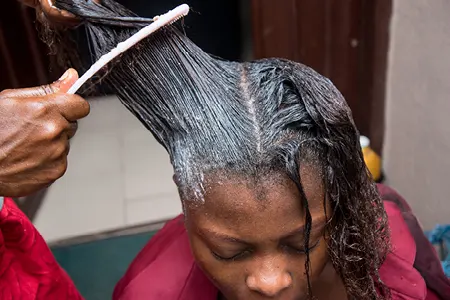Key Information About Hair Relaxer Class Action Lawsuits in 2025
There has been a growing number of lawsuits filed against hair relaxer manufacturers because of the potential link between using these products and developing ovarian cancer.

Increases in ovarian cancer caused by using hair relaxers is supported by various studies, including one from Boston University’s Black Women’s Health Study which found an increased risk of uterine cancer among postmenopausal women who use chemical hair relaxers.
Millions of women, especially African American women use, and have been using chemical hair relaxer products for most of their lives – unaware that using these products could eventually lead to serious types of cancer that can be hard to treat.
Key 2025 Hair Relaxer Lawsuit Updates to Know About
Over 9,500 Cases in the MDL – The hair relaxer lawsuits will start off 2025 with over 9,649 cases. 161 cases were added in December alone. We can expect to see this MDL continue to grow as users of hair relaxer products find out about the lawsuit and join the MDL seeking damages.
Discovery Phase of the Hair Relaxer Lawsuit – There has been a lot of back and forth between attorneys on both sides regarding the discovery phase of these lawsuits. Attorneys for plaintiffs claim the defendant has not been forthcoming with all documents and that the documents they do have are not organized.
The judge (U.S. District Judge Mary Rowland) overseeing the case has ordered discovery to be completed by February 28, 2025, and oral fact discovery by September 30, 2025. This is important because in other cases we have seen judges threaten to remove a case from MDL and send it back to the states if the Defendant stalls too long or does not appear to be moving the case forward
Bellwether Trials Not Scheduled – As of Jan 1st, no bellwether trials have been scheduled. If you are involved with, or following the hair relaxer class action lawsuits, something to watch for is the scheduling of bellwether trials. These trials are usually an event that indicate a lawsuit is moving forward and heading toward an award or settlement agreement. Bellwether trials can sometimes take one to two years to complete. Once bellwether trials are complete, this is often when you see a settlement agreement reached.
What Are Hair Relaxers?
Hair relaxers, cosmetic products predominantly utilized by African American women, serve to relax, smooth, and straighten their hair.

Millions of African American women in the United States use hair relaxer products. Recent scientific studies have discovered that the chemicals present in these hair relaxers may lead to uterine cancer.
Women who have developed uterine cancer after prolonged use of hair relaxer products are initiating product liability litigation against the producers, aiming to secure compensation for their suffering and medical bills.
The use of hair relaxers has been linked to other health concerns such as scalp burns, hair breakage and loss, and respiratory issues.
In response to these concerns, many companies have begun producing “natural” or “organic” hair relaxer products that claim to be free of harsh chemicals and safer for use. However, it is important to know that these claims are not always regulated by the Food and Drug Administration (FDA).
How Hair Relaxers Work
Chemical hair relaxers are applied to the base of the hair and left in place for a period of time. The chemicals work to break down the keratin in the hair, which results in the curliness of hair to relax so it can be more easily straightened.
Hair Relaxer Cancer Lawsuits
Researchers discovered a link between uterine cancer and the use of chemical hair relaxers by following women from 1997 until 2019.
This study concluded that:
“In this large cohort of Black women, long-term use of chemical hair relaxers was associated with increased risk of uterine cancer among postmenopausal women.”
Source: Bertrand, K. A., Delp, L., Coogan, P. F., Cozier, Y. C., Lenzy, Y. M., Rosenberg, L., & Palmer, J. R. (2023). Hair relaxer use and risk of uterine cancer in the Black Women’s Health Study. Environmental research, 239(Pt 1), 117228. https://doi.org/10.1016/j.envres.2023.117228
Only weeks after a groundbreaking study was published, establishing a link between chemical hair relaxers and an elevated risk of uterine cancer, a product liability lawsuit was initiated against several leading cosmetic companies.
These firms are now accused of their hair relaxer products being the direct cause of uterine cancer among consumers. The lawsuit, officially titled Mitchell v. L’Oreal, et al. – 1:22-cv-5815, was brought to the federal court in Chicago, representing a critical juncture in legal proceedings against major players in the cosmetics industry.

The plaintiff, Jenny Mitchell (from Missouri), had used chemical hair relaxers most of her life (since the age of 10). Like many African American women, she faithfully applied these relaxers every 6-8 weeks for 18 years, incorporating them into her hair care regimen, oblivious to the potential dangers they carried.
In 2018, at the age of 28, Jenny Mitchell was diagnosed with uterine cancer. This unexpected diagnosis was traced back to her prolonged use of hair relaxers, products she believed were safe. The discovery led to a lawsuit aimed at holding cosmetic companies responsible for risks the lawsuit claims had been ignored.
February 7, 2023 – Hair Relaxer Class Action Lawsuits Granted MDL Status
On February 7th of 2023, the court decided to centralize all hair relaxer lawsuits in federal courts into a new class action MDL. The new hair relaxer class action litigation was assigned to Judge Mary Rowland in the Northern District of Illinois in Chicago. The new MDL began with around 60 cases pending in federal courts nationwide.
Jan 2024 – Bellwether Trials Scheduled for Hair Relaxer Class Action (MDL) Lawsuits
The first bellwether trial for the Hair Relaxer Class Actions Lawsuits are now set for November 3, 2025, followed by a second trial on February 2, 2026.
Bellwether trials plays a crucial role in the MDL process. It significantly increases the pressure on defendants to consider settlement as the trial date draws near. Settlements can be reached at any time before the trial. However, after a certain point in time, settlement negotiations become even more intense as the stakes increase.
Why Bellwether Trials are Important in Class Action Lawsuits
Bellwether trials are individual cases selected from a larger group of lawsuits that are representative of the overall claims in a class action lawsuit. These trials are crucial in the class action lawsuit process for several reasons:

Overall, bellwether trials play a pivotal role in shaping the trajectory of class action lawsuits, serving as critical milestones that can influence settlement negotiations, case strategies, and the ultimate resolution of complex legal disputes involving multiple plaintiffs.
Testing Legal Theories: Bellwether trials help test the strength of legal arguments and theories that will be used in the remaining cases. The outcomes of these trials can provide valuable insights into how future cases may fare in court.
Establishing Settlement Values: By trying a few representative cases first, parties involved in the class action lawsuit can gauge potential jury reactions, determine settlement values, and assess the overall strength of the litigation.
Encouraging Settlements: Successful bellwether trial outcomes can encourage parties to settle the remaining cases, as they offer a preview of potential verdicts and may lead to a more efficient resolution of the overall litigation.
Saving Time and Resources: Rather than litigating every single case in a class action lawsuit, bellwether trials streamline the process by focusing on key cases that can set precedents and guide the resolution of similar claims.
Providing Guidance for Future Actions: Bellwether trials serve as a roadmap for how future cases may unfold, helping attorneys and parties involved in the litigation to adjust their strategies and approaches based on the outcomes of these trials.
Bellwether trials play a pivotal role in shaping the trajectory of class action lawsuits, serving as critical milestones that can influence settlement negotiations, case strategies, and the ultimate resolution of complex legal disputes involving multiple plaintiffs.

About Uterine Cancer
According to the National Cancer Institute, there are two different types of uterine cancer – endometrial and sarcoma. Endometrial uterine cancer is much more common and more treatable. The sarcoma type of uterine cancer is less common, but it is much more aggressive and difficult to treat.
Source: https://www.cancer.gov/types/uterine
Links Between Hair Relaxer and Ovarian Cancer
Several studies now show a link between the use of hair relaxers and ovarian cancer. Since these studies have been published, thousands of lawsuits have been filed against their manufacturers. Below you will find some of the key findings from these studies and links to where you can find them online:
A new study by researchers at Boston University’s Black Women’s Health Study (BWHS) has reported the following:
“Within a large cohort of Black women followed for up to 22 years, hair relaxer use was associated with an increased risk of uterine cancer among postmenopausal women, but not premenopausal women. Compared to women who never or rarely used hair relaxers, postmenopausal women who reported using chemical hair relaxers more than twice a year or for more than five years had a greater than 50% increased risk of uterine cancer.”
Source: https://doi.org/10.1016/j.envres.2023.117228

Another Study published in the Journal of The National Cancer Institute indicates:
Hair straightening products may contain hazardous chemicals with endocrine-disrupting and carcinogenic properties. Previous studies have found hair product use to be associated with a higher risk of hormone-sensitive cancers including breast and ovarian cancer; however, to our knowledge, no previous study has investigated the relationship with uterine cancer.
Hair product use, a predominant exposure pathway to various EDCs, has been associated with hormone-sensitive cancers including breast and ovarian cancer in previous epidemiologic studies. Hair product constituents, including formaldehyde and formaldehyde-releasing chemicals in some straighteners, and oxidized para-phenylenediamine and 4-aminobiphenyl in hair dyes, have also played a potential role in carcinogenesis, supporting an association between hair product use and cancer development.
Endocrine Disruption Chemicals in Hair Relaxers
Endocrine disruption chemicals (EDCs) can be harmful to humans due to their ability to interfere with the body’s endocrine system, which is responsible for regulating hormones essential for growth, development, metabolism, and various physiological functions. Here are some ways in which EDCs can pose harm to human health:

Hormone Imbalance: EDCs can mimic natural hormones in the body or block hormone receptors, leading to hormonal imbalances. This disruption can result in reproductive issues, thyroid disorders, metabolic problems, and even certain types of cancer.
Developmental Effects: Exposure to EDCs, especially during critical developmental stages such as in utero or during childhood, can impact growth, neurodevelopment, and overall health outcomes later in life.
Reproductive Disorders: EDCs have been linked to fertility problems, menstrual irregularities, and reproductive disorders in both males and females. They can affect sperm quality, hormone production, and the functioning of reproductive organs.
Metabolic Disorders: Certain EDCs are associated with an increased risk of obesity, diabetes, and other metabolic conditions by disrupting insulin signaling and lipid metabolism.
Immune System Disruption: EDCs can weaken the immune system, making individuals more susceptible to infections, allergies, and autoimmune diseases.
Cancer Risk: Some EDCs have been classified as potential carcinogens and are linked to an increased risk of developing various types of cancers, including breast, prostate, and ovarian cancer.
Sources:
https://pubmed.ncbi.nlm.nih.gov/31792807/#:~:text=EDCs%20may%20interfere%20with%20synthesis,in%20disturbance%20in%20energy%20homeostasis
https://www.epa.gov/endocrine-disruption/overview-endocrine-disruption#:~:text=Effects%20of%20Endocrine%20Disruption,-In%20the%20last&text=developmental%20malformations%3B,immune%20and%20nervous%20system%20function
Formaldehyde Exposure from Hair Straighteners

Many hair straightener products caused users to be exposed to Formaldehyde. Prolonged exposure to formaldehyde has been linked to many types of cancers. In October 2023, the FDA proposed a ban on the use of hair straighteners that created exposure to formaldehyde. That rule was supposed to go into effect as of April 2024 – but so far, the FDA has missed its own proposed deadline and the rule has not yet gone into effect
Summary – Hair Relaxer Lawsuits 2025
There has been a growing number of hair relaxer lawsuits filed against hair relaxer manufacturers because of the potential link between using these products and developing ovarian cancer.
Increases in ovarian cancer caused by using hair relaxers is supported by various studies, including one from Boston University’s Black Women’s Health Study which found an increased risk of uterine cancer among postmenopausal women who use chemical hair relaxers.
Another study published in the Journal of The National Cancer Institute also indicates that hair straightening products may contain hazardous chemicals with endocrine-disrupting and cancer-causing properties.

These chemicals, known as endocrine disruption chemicals (EDCs), can have a range of negative effects on human health. This includes hormone imbalances, developmental issues, reproductive disorders, metabolic disorders, weakened immune systems, and an increased risk of cancer.
Formaldehyde exposure from hair straighteners has also been linked to various types of cancers, leading the FDA to propose a ban on these products in October 2023. However, as of April 2024, this rule has yet to go into effect.
Because of the potential health risks associated with hair relaxers, there has been a push for increased regulation and stricter safety standards in the beauty industry. This includes calls for more transparency in labeling, as well as greater oversight from regulatory agencies to ensure that products are safe for use.
As lawsuits continue to be filed and studies uncover additional links between hair relaxer use and cancer, it is important for consumers to educate themselves and make informed decisions about the products they use.
About the Authors
Balanced Bridge Funding offers legal funding solutions for plaintiffs, plaintiff attorneys, attorneys, and law firms. To talk to one of our legal funding specialists about getting help managing your law firm cash flow, please call (267) 457-4540 or email info@balancedbridge.com
Or to apply online, simply CLICK HERE and fill out our quick form application.







